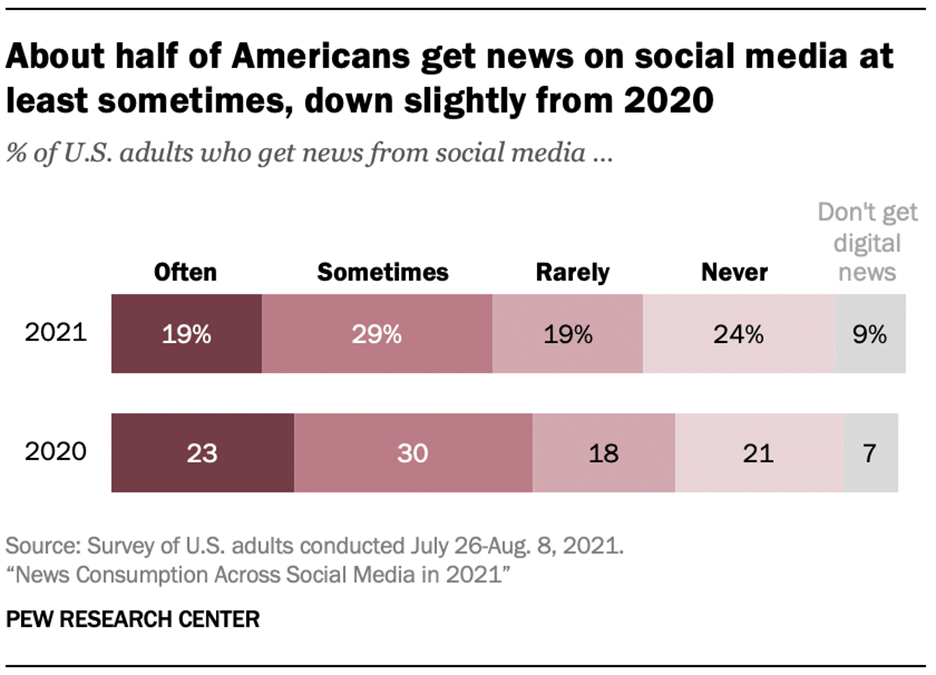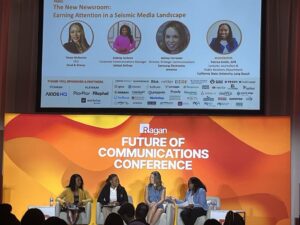Report: Nearly a third of Americans consistently get news from Facebook
Despite the lack of trust in major social media platforms, users still cite them as important sources of information.
After recent revelations about the emotional and societal damage sites like Facebook and Instagram are having on the world, there is a question about the relevance of social media moving forward.
Whistleblower Frances Haugen called the company to task in testimony to Congress about failures to promote civil discourse and protect young users’ mental health. Brand managers are reconsidering their connections to these platforms, perhaps. Yet, Americans are still relying on these platforms for news—making them indispensable for communicators trying to share brand stories.
Per data from Pew Research Center, Americans’ reliance on social media for news is down slightly from 2020, but 46% of U.S. adults still get news from social media at least sometimes.

Specifically, nearly a third of Americans get news from Facebook. Per the data, 66% of U.S. adults regularly use the site, and 31% regularly get news from the platform.
That compares to 72% of U.S. adults who use YouTube regularly, compared to 22% of U.S. adults who say they regularly get news from the site.
These numbers are a reminder to communicators of the need to define their brand and its values on major social platforms.
Here are some top tips for engaging with social media from recent guest contributors on PR Daily:
- Don’t assign social media to the interns. Not only do many social media tasks require expert strategic skills and resources, but plunking your interns on social media accounts fails to prepare them for the full scope of PR work, argues Emily Wenstrom, vice president with Stanton Communications.
- Don’t expect social media to be a silver bullet. Think carefully about the customer journey before you start dumping content onto social media, argues Atul Minocha, partner at Chief Outsiders. Social media can feel like a quick way to check a marketer’s box, but that kind of mindset is dangerous.
- Ask if a platform is really a fit for your organization. Michelle Knight from Brandmerry offers three questions that brand managers must ask before joining a new platform: Is my audience there? Do I have the capacity for this? Does this fit with how I do business?
- Create your social media “elevator pitch.” Boil down your strategy for your social media content into three sentences. Use this “pitch” to keep stakeholders aligned, argues social media strategist Gerry Moran.
- Prioritize authenticity. “Social media contests are like the viral videos of 10 years ago,” shares Paige Guzman, CMO with Lagunitas. The only way to stand out in a crowded marketplace is to be true to your brand identity while remaining creative. “Just like there were a million viral videos back in the day before TikTok, there’s a ton of social media contests,” Guzman says.
- Embrace user-generated content. With fewer opportunities for capturing the moment in-person, social media pros can help build community by putting the call out for submissions. That’s the advice from Meggan Hood, division director of tourism at Explore Georgia.
What’s your advice for connecting on social media in 2021 and beyond?
Share your ideas in the comments, please, or we would always love to hear from you on social media @PRDaily on Twitter or LinkedIn.
Learn more about the future of social media and public relations by joining us for Communications Week, Nov. 15-19.








Judge whether Facebook and others in PR may be relying too much on the truth.
In a PR crisis, the truth while good is not your only defensive weapon nor may it be your best one.
THE TRUTH MAY NOT BE WHAT MATTERS MOST to the public. People may care more about “which outcome would be better for US?” It’s like a jury not required to be impartial but that may benefit more if a verdict is not guilty rather than guilty.
THE TRUTH MAY NOT BE ON YOUR SIDE. Many things may be true just as a jury may consider many pieces of evidence, pro and con. You certainly want the truths on your side to be known but recognize that “the whole truth” may not entirely favor you.
THE PUBLIC’S VERDICT WILL DEPEND PARTLY ON EMOTIONS, not just the facts. When a jury dislikes the race or attitude of an accused individual, it’s like the public disliking the wealth of an accused company or royal family.
Facebook has skillfully written a persuasive ad on how much it cares about the public and is spending to protect the public against misinformation. A company in the tobacco and vaping business may be spending even more on how dedicated to the public it is. But who cares?
PR success in a crisis is more likely if in addition to relying on the truth we also rely on generating public EMOTIONS that favor our side.
Out of every 1,000 Americans, would we guess that even 100 give a damn about Saudi Arabia, United Arab Republic, Japan or Mexico? But how about if a country announces it will spend a billion dollars over the next ten years to try finding us a cancer vaccine? Backing a close-to-success research team at Johns Hopkins, Stanford or Memorial Sloan Kettering Cancer Center could save the one in every five of us who as of now is likely to die of cancer. Would well over 900 of every 1,000 Americans want THAT protective country to be allowed into membership in the NATO mutual defense alliance so the country is safe and keeps funding $100 million a year to protect us?
It could happen for Facebook or one of the other big companies that would-be
trustbusters now hope to bust. An account that is trusted is less likely to get busted.
Ask not what’s love got to do with it because even SAFER for a company than being seen as right is ALSO being loved. We yearn for love, spend for love and marry for love. We may care about some corporate truth as we should but we may care even more about love. So should Facebook.